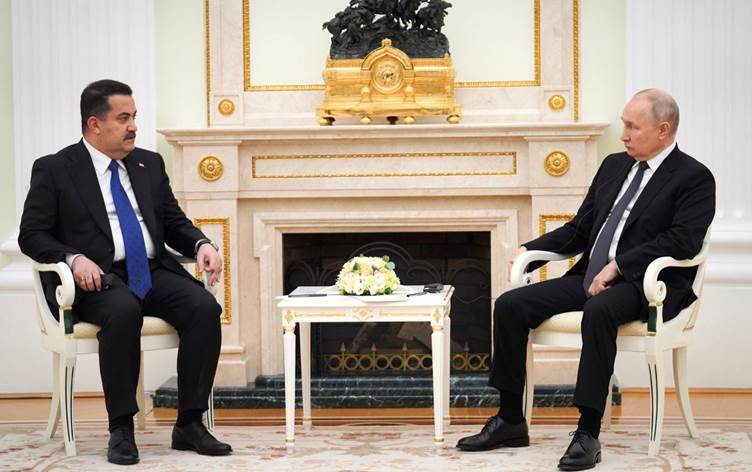ERBIL, Kurdistan Region - Russian President Vladimir Putin received Iraqi Prime Minister Mohammed Shia’ al-Sudani in Moscow on Tuesday and the two discussed a variety of subjects, including Baghdad-Moscow bilateral ties, cooperation in the energy sector, and the Israel-Palestine conflict.
Hamas militants launched a multi-pronged air, ground, and sea offensive and penetrated into Israeli territory on Saturday at dawn, resulting in Israeli Prime Minister Benjamin Netanyahu’s declaration the following day that the country was “embarking on a long and difficult war.”
Sudani called the escalation between Israel and Hamas the "natural result" of Israel's crimes and violations against Palestinian people met by "international silence" over the years. He held Muslim countries and world powers responsible for bringing an end to the “Israeli occupation’s” violations against Palestinians.
“Today the responsibility lies on all of our shoulders, as Arab and Muslim countries, and of course, Russia, a permanent member of the [UN] Security Council. There will be a moral responsibility on the shoulders of world powers to stop these violations and this siege which aims to destroy the Gaza Strip,” said the Iraqi premier.
Iraq maintains a hardline stance against Israel. The Iraqi parliament in May of last year passed a bill criminalizing all relations with Israel and making it punishable by death. The law requires almost all officials, including those in the Kurdistan Region, government institutions, and media to refrain from establishing relations with Israel.
Putin said that the recent deterioration of the security situation in the Middle East shows Washington’s “failed policy” in the region, as well as lack of consideration for the fundamental interests of the Palestinian people, including the establishment of an independent Palestinian state.
“I think that many will agree with me that this is a clear example of the United States’ failed policy in the Middle East, which tried to monopolize the settlement process, but, unfortunately, was not concerned with finding compromises acceptable to both sides,” said the Russian President.
Hamas has called on “resistance fighters” in Arab countries to join its campaign dubbed “Operation Al-Aqsa Flood” against Israel while the US has reiterated its support for Israel, with Defense Secretary Lloyd Austin announcing that Washington would be sending equipment and munitions to Israel, the first shipment of which arrived at Nevatim Airbase in southern Israel on Tuesday.
Over 2,000 people have been reported dead on both sides since Saturday. The Israeli army has reported over 1,200 dead while Palestinian officials have placed their death toll at 950.
Iraq supports stability everywhere: Sudani to Putin
Sudani stressed that Iraq remains committed to promoting dialogue and supporting stability "everywhere", including in "the crisis with Ukraine," considering the country’s long history with war and instability.
“That is why our constant and permanent stance is to support dialogue, and to find peaceful solutions to stop these disputes which have left major negative effects from a humanitarian and recently an economic perspective,” said Sudani.
In March 2022, Iraq abstained from voting against Russia’s invasion of Ukraine in a United Nations General Assembly (UNGA) vote denouncing the invasion, showing Baghdad’s willingness to maintain its relations with Moscow.
Energy
Both leaders touched on the “historic” relations between Iraq and Russia, marking the 80-year-anniversary of diplomatic ties next year. The two countries first established diplomatic relations in 1944.
The Iraqi prime minister thanked Moscow for supplying Iraqi troops with weapons during the war against the Islamic State (ISIS).
After ISIS seized control of Iraq’s second largest city, Mosul, in 2014, Russia sent a batch of second-hand Su-25 attack planes to Iraq based on Baghdad’s request.
Putin highlighted Moscow and Baghdad’s “successful” relations in the field of energy and trade, saying that the investments of Russian companies in Iraq amount to nearly $19 billion, and adding that there was room to further enhance cooperation in that sector.
Sudani agreed that the two countries play a significant role in the global energy economy, stressing the need to continue both “bilateral coordination and cooperation within the OPEC+ format.”
The two leaders are set to partake in the sixth Russian Energy Week forum in Moscow on Wednesday.
Iraq and the Kurdistan Region share close economic ties with Russia as a number of Russian oil companies operate both in the Region and in oilfields in southern Iraq. Lukoil, Gazprom Neft, and Rosneft are some of the major Russian oil and gas companies operating in Iraq and the Kurdistan Region.
Russian Foreign Minister Sergey Lavrov visited Baghdad in February, mainly with the aim of solving the financial dues of Russian companies in Iraq.








Comments
Rudaw moderates all comments submitted on our website. We welcome comments which are relevant to the article and encourage further discussion about the issues that matter to you. We also welcome constructive criticism about Rudaw.
To be approved for publication, however, your comments must meet our community guidelines.
We will not tolerate the following: profanity, threats, personal attacks, vulgarity, abuse (such as sexism, racism, homophobia or xenophobia), or commercial or personal promotion.
Comments that do not meet our guidelines will be rejected. Comments are not edited – they are either approved or rejected.
Post a comment